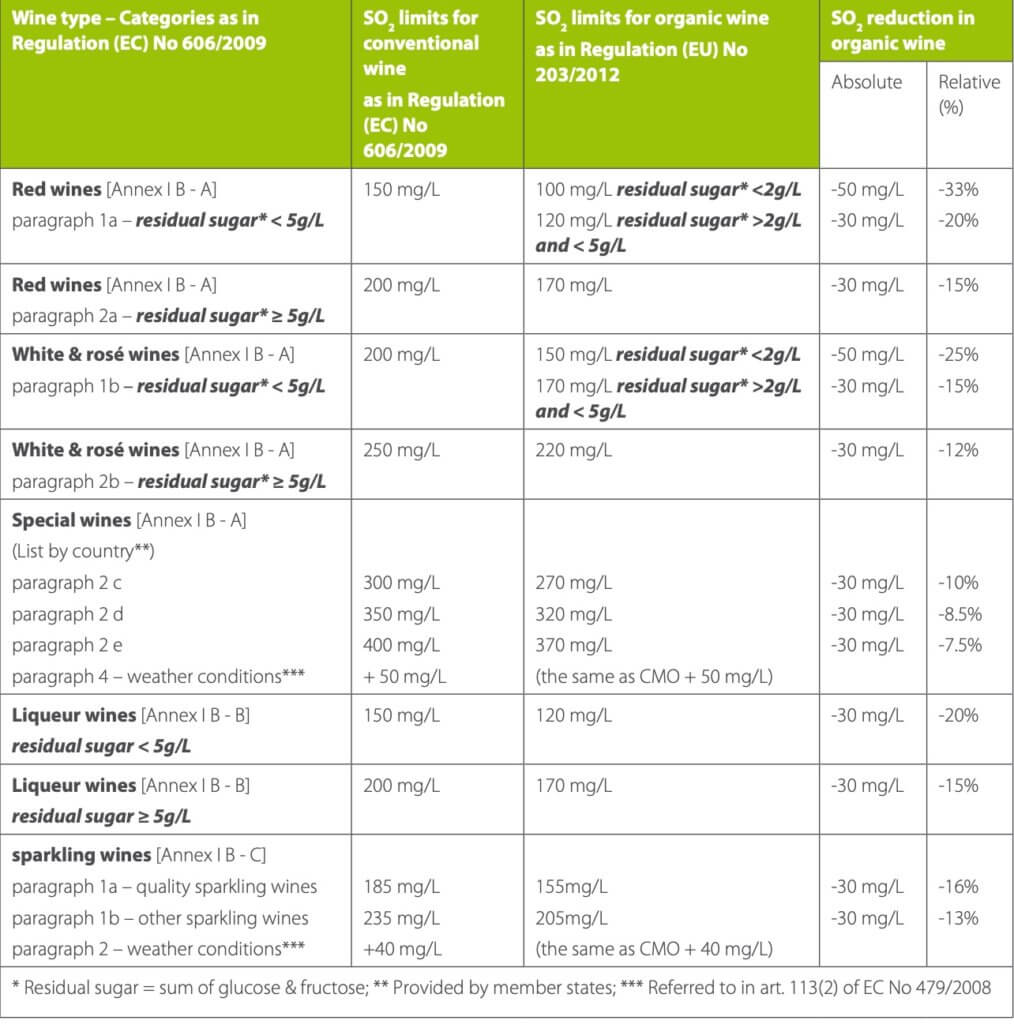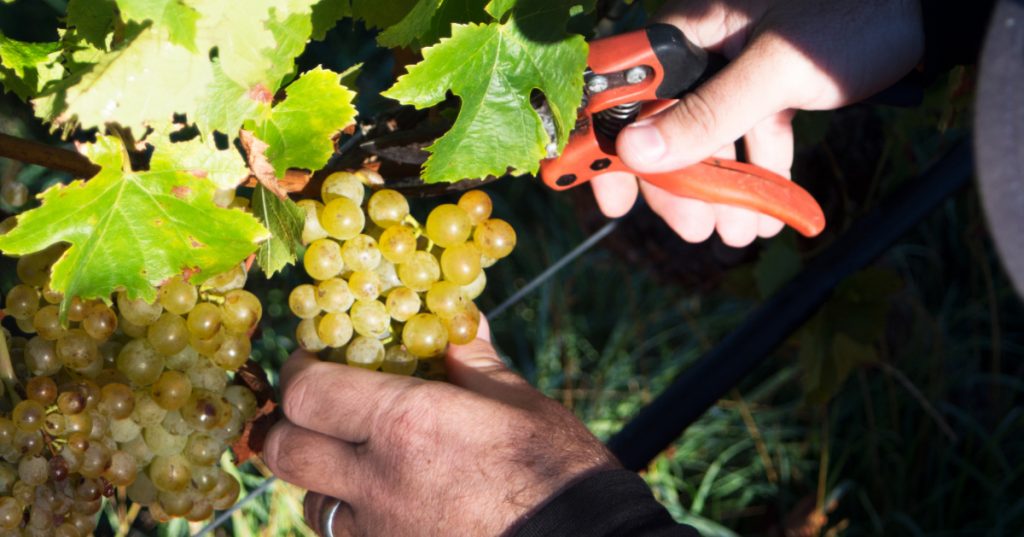Low Sulphur, Organic Wine, Sulphites
Is Organic Wine Sulphite Free Wine?
Is organic wine sulphite-free wine?
Sadly, the short answer is no. Sulphite free wine doesn’t exist because sulphites are naturally present due to all wine’s fermentation process. But what makes the difference is the levels of sulphur in wine.
Hold on, don’t jump to any conclusions just yet. Stay with us, we’re getting to the bottom of this organic wine story.
First things first.
How is organic wine produced?
Organic wines and natural wines are produced with minimal intervention in the winery. Winemakers who are producing organic wine and natural sulphite free wines encourage natural processes in the winery. They follow organic certification rules and organic farming practices which are strict about what is happening in the vineyard. Organic farming is farming which uses no synthetic chemical products – no artificial chemicals or harmful pesticides.
Organically certified wine is wine that is produced from 100% organically grown grapes and the wine is manufactured without the use of any chemicals.
So, sulphites aren’t added to organic wine or natural wines. It stands to reason therefore, that organic wine must be sulphite free wine.
This is where things can get a little murky.
Wine without sulphites and EU legislation: limiting sulphur levels in wine
As of August 2012, within the Regulation (EU) No 203/2012, wine is recognised as an organic product.
Besides laying down rules on organic winemaking, the biggest success of the new legislation, as explained in the IFOAM report, is the compromise on limiting the amount of sulphites in organic wine (the level of sulphites in wine is measured in “ppm,” or parts per million).
For the wine lovers, this means:
- Dry red organic wine can have up to 100 mg per litre of sulphites
- Organic white wine can have up to 150 mg per litre of sulphites
- Organic rose dry wines can have up to 150 mg per litre of sulphites

EU regulations surrounding food labelling require wine bottles to display the warning ‘contains sulphites’, if the wine has more than 10 parts of sulphite per million parts of wine (ppm).
So, a consumer could make an educated guess.
If a wine with sulphites has greater than 10ppm – a wine with less than 10ppm, it is sulphite free, or at the very least, low in sulphites.
That is, the minute volume of natural sulphites (less than 10ppm) that occur during the wine’s fermentation are natural, and harmless. This number is nothing like the volume of man-made chemicals that are pumped into mass-produced wine during all stages of the wine production process, to extend its shelf life.
USDA Organic Wine Labelling: “Organic wine” and “Made with Organically Grown Grapes”
Organic wine produced (and imported) in the United States falls into 2 categories “Made with Organically Grown Grapes” and “Organic”. Wines in both categories are made with 100% USDA Certified Organically Grown Grapes, but the difference is in the use of sulphites.
- Wines that are allowed to display the USDA organic seal on the label are wines with No Sulphites Added
- Sulphites levels in “Made with Organically Grown Grapes”
- Sulfur dioxide may be added to yield less than 100 parts per million in finished grape wine, but may not be added to wine “made with” other organic fruit (e.g., apples). (as defined by the USDA)
- Sulfur dioxide may be added to yield less than 100 parts per million in finished grape wine, but may not be added to wine “made with” other organic fruit (e.g., apples). (as defined by the USDA)
To dig deeper into this subject.
When making conventional wine, literally hundreds of chemicals can be and are used, not just added sulfites. Some conventional winemakers add sugar, oak chips and flavour agents. On the other hand, (or in the other glass) wine that is certified organic is allowed to have about 70 chemicals added to it, including organic and naturally occurring acids, salts, and enzymes. However, unlike in conventionally produced wine, any chemical used in a certified-organic wine cannot have an adverse effect on the environment or on human health as defined by the Food and Drug Administration. – Organic Vineyard Alliance
Needless to say, other countries can have “different” rules on organic wine certification and organic winemaking, and certainly differently understand “sulphite free wine”, “low sulphur wine” and “wine without sulphites”.
One such example is Italy. With 16.6% organically cultivated vineyards (26% of the world’s organically farmed vineyards), Italy is the leader grower of organic grapes. A growing number of health conscious organic winemakers in Italy employ organic and sustainable practices that safeguard the environment, and lower the carbon and water footprints.
They were quite disappointed with the rules for labelling organic wines (Regulation from 2012), hoping for complete elimination of the use of sulphites in the organic wine. Can we say that Italian winemakers produce organic wines? As one of the world’s biggest wine producer, Italian organic wine is booming.
So, is organic wine low sulphite wine?
Or is it a wine without sulphites?
Whilst no sulphites will have been added to organic wine, they can still contain between 10-40ppm of naturally occurring sulphites. But that is nothing in comparison to standard wine, as the EU allows up to 220ppm sulphites per bottle of wine, and the kicker is, you don’t know which wine contains what volumes of sulphites. But it begs the question, why are sulphites added to wine?
Why are sulphites added to wine if they’re already naturally occurring?
If you’ve ever looked at the label on a bottle of standard wine, you’ll have seen it bears the words ‘contains sulphites’ and most likely assumed that sulphites are naturally occurring in wine, making the warning about as superfluous to requirement as ‘contains shellfish’, prominently displayed on a lobster.
And you would be right.
To answer this we need to understand what sulphites are and how they are used. Sulphites are a preservative commonly used in the food and drink industry to extend the shelf-life of consumable produce. They are added in mass to mainstream wine to preserve it as they essentially prevent oxidation from occurring.
Sulphites come in many forms and this is how you can recognise them:
- sulphur dioxide (SO2)
- potassium bisulphite
- potassium metabisulphite
- sodium bisulphite
- sodium metabisulphite
- sodium sulphite
So in the case of wine production, regardless of the form they take, their addition is to maintain the freshness of your bottle of wine. That is good in theory, but problems arise if you are a wine lover but have a sensitivity to sulphites.
What is the difference between wines without sulphites and with sulphites?
The taste is the difference.
If you’ve ever eaten a supermarket own steak and then chowed down on a grass-fed, organic steak, you will not have failed to notice the difference between the two.
The depth of flavour, for one thing, the freshness of the meat, the colour difference setting the two apart. And this is all down to a lack of chemicals and preservatives.
And the same is true for wine.
If you want to experience great tasting, fresh wine as it should be drunk, look no further than organic wines or natural wines. Just don’t let them hang around in your wine cellar as they won’t last as long as the mass produced stuff.
The impact they have on your health.
Without the addition of chemicals and preservatives such as sulphites, an organic bottle of wine is as clean and as fresh as they come, not only making it better for your body but better for the planet and the environment too.
People with a sulphite sensitivity can react in a variety of ways to the sulphites:
- trouble breathing
- tingling sensations
- swelling in parts of your body, including your mouth and throat
- nausea and vomiting
- headaches
- rashes and itching
In severe allergic cases, sulphites will cause an anaphylaxis reaction.
Which brands produce sulphite free wine?
If you’re looking for a wine free from sulphites in order to avoid health concerns, or if you’re keen to keep pesticides and chemicals from entering your body, or if you just want to drink without the requisite sore head the next day, make sure to include organic and natural wines at the top of your wine shopping list.
To be doubly sure, opt for organic wines that have been certified by organic organisations such as Nature&Progrès, as these organisations have their own extra strict criteria for wines that want to carry their organic certification label.
Not only do these wines have to be made from grapes grown in a wholly organic manner, but they need to follow the organisation’s rule book on winemaking, to the letter. And in the case of Nature&Progrès, this includes only allowing levels of sulphites to reach just half of the levels allowed by the EU.
The moral of the organic wine story
Whilst organic wines are not always sulphite free, their levels of sulphites will be minimal compared to standard wines.
At Pull The Cork we make sure that our range of organic wines is the best on offer. We have tasted our selection of artisan red, rose and white organic wine and select only premium organic wines from top producers from all over the world.


Thanks, I am a mother and very busy! This helped me a lot!
I reacted almost as badly to Woolworth’s organic wine. Rashes on my legs and an itchy head and eyes ….. I have a huge sulphur intolerance … love wine with my dinner ……
Amazing! This has helped me out so much!
I drink Woolworths organic red only. The best thing since the invention of the wheel. No babalas, head ache etc. anymore. For the price, a clear winner. This is my anti cholesterol medication as I am extremely sensitive to statins and vibrates. Can not use it at all. Proof in three muscle repair operations over several years, and one to go. So, doctor’s orders. JIP., It is the very truth! My lock down stock is going down and I can not get any now. Ouch!